Scratch Tardis Original Design / Scratch Built
Scratch - Tardis {Scratch}
Contributed by Jamie Halpin
| Manufacturer: | Scratch |
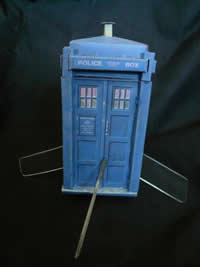
Brief:
Scale model of Doctor Who's TARDIS
Construction:
- 1 cardboard box shaped body
- 4 1/8 plexiglass fins
- 2 cardboard centering squares
- 70 mm cardboard tubing from a roll of aluminum foil
- 3 ft Chinese underwear elastic
- 1 custom nose cone - see below
When I first saw the Estes Port-a-Pot Shot I laughed so hard that I nearly bought one. Then I thought: If you are going to make a flying booth, shouldn’t it be a Police Box?
The first thing I needed was some plans for a TARDIS. I found just what I needed at www.ironcowprod.com. Just print out one copy of the front, three copies of the sides, and one copy of the supports. Then I sprayed the back sides with 3M Super 77 and laminated them onto some posterboard. (If you haven’t heard of Super 77 get some! It is a spray on contact cement that is ideal for rolling your own body tubes, rolling your own nose cones, gluing on your own printed decals, laminating TARDIS plans to posterboard, etc.) Then I cut them out and started to assemble according to the instructions. Once I had the sides and base dry fitted, I realized that one layer of flat posterboard is far too wimpy to withstand the forces of flight. Have no fear! I found some 1/8" corrugated cardboard in my “This might be handy for building a rocket” bin. This could by laminated to the backside to provide all of the strength I needed. But first, I had to cut the sides in half at the top of the door to create the separation plane for the nosecone. Then I cut my corrugated cardboard to fit, sprayed it with Super 77 and laminated it into the inside of the sides. Since I already had all of the slots cut, I cut the cardboard to fit inside of them also making allowance for the thickness of the cardboard so that the whole thing would still assemble nicely.
This is the first place where I could have saved some weight. I should have laminated the sides straight to the cardboard and skipped the poster board (hindsight is 20/20). The small trim pieces need to be laminated to poster board so that they can be folded to make nice sharp corners. The posterboard/cardboard combination was beautiful for the base. I glued a square of cardboard on to the backside of the square centre part and left all of the foldy bits with just poster board so they folded up nicely. Of course, I folded it up before gluing in the cardboard to make sure that the cardboard would still allow it to fold properly. I also cut a 1" circular hole in the centre of the base for my engine mount.
I’m not sure that I could improve on the posterboard/cardboard combination for the nosecone/roof . You have to make a clean fold for the roof edge and the edges of the material are visible where the triangular roof sections glue together. I glued cardboard onto the inside of the upper section of the sides with Super 77 before assembly. Then, with the pieces flat on a cutting board, I cut all of the slots. I left the triangular roof parts backed with posterboard only. I pre-folded everything, then assembled the roof by hot gluing the tabs of the triangular parts together. The upper sections of the sides were held together with a bead of hot glue. I precut four triangular pieces of cardboard using the roof sections as a template, dry fitted them into the inside of the roof with a lot of trimming, then hot glued them into place.
Once I added all of the trim pieces and tacked them in place with carefully applied hot glue, I had a TARDIS that looked better than some of the sets the BBC used in the 60's! As a bonus, it was almost the exact size of the Port-a-Pot Shot. Now all I had to do was make it fly!
For an engine mount I used a piece of 1" tubing that was the core of a roll of aluminum foil. Great stuff. It has an interior diameter of exactly 24mm. I cut a piece the same length as a D-engine (70mm) then white glued a thrust ring cut from a spent engine casing into one end. This leaves the engine sticking out just far enough to get a grip on from removal after flight (sometimes pliers are needed). Then I started on my baffle. I hate recovery wadding. You litter the stuff all over the place, it jams in your body tube, and despite all of this, your parachute still melts. Baffles are a beautiful solution. They filter out all of the hot particles that would otherwise melt your chute and only allow the gasses to pass through. I have never had a chute melt with a baffle.
I made baffle for the TARDIS by wrapping a piece of posterboard 35mmX150mm around the motor mount and marking the
overlap. Then I sprayed the overlap with Super 77 and wrapped the poster
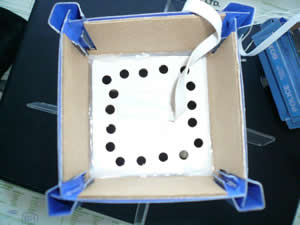 board
around the motor mount again to glue it into a tube. I slid the tube off and punched two rows of holes in the bottom
with a one hole punch leaving 5mm of posterboard before the first row of holes to slide the tube over the end of the
engine mount and hot glue it in place. Next, I cut a square of corrugated cardboard that would fit perfectly into the
inside of the TARDIS. I marked a 1" circle in the exact centre and punched a row of holes along the outside edge
with my one hole punch. Hot glued the end of the tube to the circle on the cardboard and slid the whole baffle/motor
mount assembly into the TARDIS from the top. Once in position, I ran a bead of hot glue around the upper edge of the
baffle where it met the TARDIS walls and a second bead around the end of the engine mount where it protruded from the
base of the TARDIS.
board
around the motor mount again to glue it into a tube. I slid the tube off and punched two rows of holes in the bottom
with a one hole punch leaving 5mm of posterboard before the first row of holes to slide the tube over the end of the
engine mount and hot glue it in place. Next, I cut a square of corrugated cardboard that would fit perfectly into the
inside of the TARDIS. I marked a 1" circle in the exact centre and punched a row of holes along the outside edge
with my one hole punch. Hot glued the end of the tube to the circle on the cardboard and slid the whole baffle/motor
mount assembly into the TARDIS from the top. Once in position, I ran a bead of hot glue around the upper edge of the
baffle where it met the TARDIS walls and a second bead around the end of the engine mount where it protruded from the
base of the TARDIS.
The next thing any rocket needs is fins. I made one major change here from the design of the Port-a-Pot Shot.
Rather than mount the fins at the corners, which are the strongest point on the rocket, I
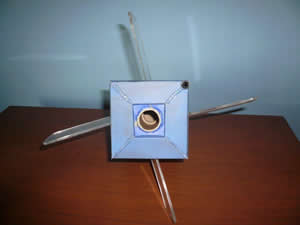 decided to
mount them to the centres of the flat sides, which are the weakest point on the rocket. Why would I do such a fool
thing? So that I could mount them on a slight angle to make the rocket rotate in flight like the real TARDIS! I
lengthened the fins to 9 cm to compensate for the fact that they were mounted closer to the centre that the Estes
corner mounted fins. I liked the look of the Estes clear fins so I bought myself some 1/8" plexiglass. It is great
stuff to work with. You can cut it and sand it with your woodworking tools then flame polish it perfectly with your
propane torch. There is one serious drawback to plexiglass that makes it entirely impractical for rocket fins. It has
about the same density as lead. Once had the fins epoxy glued in place, I weighed the TARDIS, found the centre of
gravity and fed the data into RockSim. I was appalled to discover that I needed to add 13.5g of clay to the nosecone to
keep it stable. The final mass of the rocket was a whopping 224g. It wasn’t a TARDIS, it was a brick! The Doctor
and his Companion wouldn’t get far through space in this puppy!
decided to
mount them to the centres of the flat sides, which are the weakest point on the rocket. Why would I do such a fool
thing? So that I could mount them on a slight angle to make the rocket rotate in flight like the real TARDIS! I
lengthened the fins to 9 cm to compensate for the fact that they were mounted closer to the centre that the Estes
corner mounted fins. I liked the look of the Estes clear fins so I bought myself some 1/8" plexiglass. It is great
stuff to work with. You can cut it and sand it with your woodworking tools then flame polish it perfectly with your
propane torch. There is one serious drawback to plexiglass that makes it entirely impractical for rocket fins. It has
about the same density as lead. Once had the fins epoxy glued in place, I weighed the TARDIS, found the centre of
gravity and fed the data into RockSim. I was appalled to discover that I needed to add 13.5g of clay to the nosecone to
keep it stable. The final mass of the rocket was a whopping 224g. It wasn’t a TARDIS, it was a brick! The Doctor
and his Companion wouldn’t get far through space in this puppy!
If you know of a lighter clear plastic than plexiglass that can be worked with, I would love to know about it. I’ve tried CD jewel cases, but they are so brittle that they shatter if you try to cut them. My current thought is to borrow an idea from Dr. Zooch’s flame fins that he uses to stabilize his Space Shuttle and Ares rockets. You could make a 37mm extension to the base of the rocket with nice light corrugated cardboard and glue some nice light balsa fins to it. The motor mount could be glued to the base and the tube of the baffle could be extended to reach to the base of the TARDIS proper. (You would have to make the tube in two pieces so that you could punch the holes in the middle.) This extension base and fins could be painted matt black to reduce its appearance on the launchpad and in flight, and could be removed for display purposes. The additional length would also help to stabilize the rocket. Maybe that will be my TARDIS’s next regeneration.
Rocksim advised a 55cm diameter chute for this brick. My friend Tom taught me how to scratch build rockets. He has a marvellous technique for making round parachutes. By a bag of orange garbage bags at the dollar store for a buck. You now have a lifetime supply of parachute material unless you teach your high school physics classes to make rockets. Then you have a one semester supply. Cut a square about 10% bigger than your intended chute. Fold the square in half and then in half again to from a square 1/4 the size of the original. Here is the important part: Find the folded side that shows only one fold. Fold it toward the side that shows two folds, making a triangle. Take the new side with one fold, and fold it toward the side showing now three folds making a skinnier triangle. Repeat until you can’t fold the plastic anymore or you don’t think your scissors will cut through the plastic, whichever comes first. Measure the intended radius of your chute from the tip and cut the plastic at this point. Unfold and you will have a pretty convincing circle. The creases will make it really easy to see where to apply masking tape reinforcements and punch holes to attach eight shrouds.
Tom’s should be patented shock cord mount is similar in its elegant simplicity. Cut a piece of paper
11cmX7cm. (This is actually 1/8 of a standard 8½X 11 piece of typing paper.) Fold in half lengthwise. Fold in half
width wise twice and unfold.
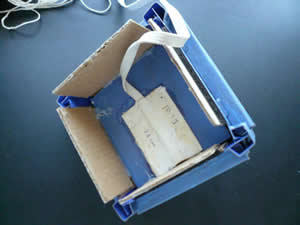
Run a bead of white glue halfway between the length wise fold and the edge. Place the end of your elastic onto on the glue on one of the squares at one end.
Add a dab of glue on top of your elastic. Fold the paper in half lengthwise squeezing glue everywhere. Add a dab of glue on the paper where it covers the end of the elastic. Fold the elastic onto the dab of glue and put another dab on top of the elastic.
Roll the paper by folding along the crease lines adding a dab of glue each time until you have a very gluey rectangle 3.5cmX2.75cm. Put a dab of glue on this and stick it inside your rocket wherever appropriate.
I hot glued four 6X3cm pieces of cardboard to the inside the bottom edge of the nose cone to form a shoulder, then hot glued a square of cardboard to their bases. I glued one end of my elastic to this, and the other to the centre of the baffle using Tom’s should by patented mounts.
All that was missing was a launch lug. No it wasn’t! Look at those lovely trim pieces along the edges. They are perfect for a launch lug if only they were open on the bottom. I used a technique I learned from Jimmy Yawn for drilling clean holes in cardboard. Find a nail of your desired diameter, hold with vice grips, and heat with that propane torch that so nicely polished the plexiglass fins. Once the nail starts to glow, press it into the cardboard, and presto, a little smoke, and a nice clean hole.
Engine retention was accomplished with the good ol’ masking tape technique. Wrap masking tape
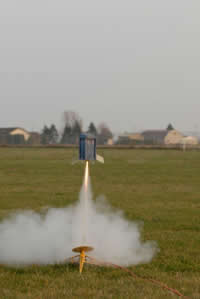 around the
engine about 1 cm from the bottom until you can barely press the engine into the motor mount. For up to D engines, that
is all the retention you need!
around the
engine about 1 cm from the bottom until you can barely press the engine into the motor mount. For up to D engines, that
is all the retention you need!
Flight:
I've flown the TARDIS twice on an Estes D12-3. Rocksim says the delay is perfect. My eyes say it is about 2 seconds
too long. The rocket arcs slightly during powered flight and arcs completely over during the coast phase. The parachute
deploys nicely and the recovery harness is sufficient for the loads caused by the late deployment.
Summary:
Her Achilles Heal is her fins. On the first flight two fins came loose and one tore off completely on landing. They
were solidly epoxied to the paper with the design on it. The paper is held on only with 3M Super 77. Super 77 is
amazing stuff, but it just isn't up to holding on fins. The fins just ripped the paper off. I re-glued them with white
glue. On the second flight, only the fin that hit ground first tore off.
Another drawback is my clever internal launch lug. The overlapping edges of the sides that are hidden by the trim pieces bind on my 3/16 stainless launch rod forcing me to use my wimpy Estes 1/8 aluminum rod that bends like a reed in the wind.
Sponsored Ads
 |
 |











